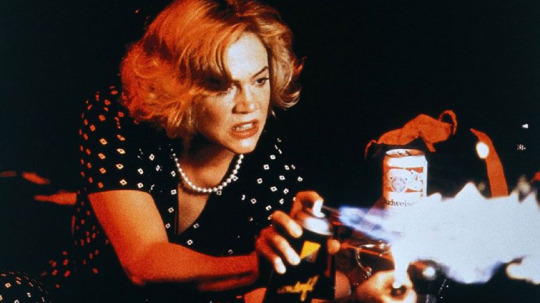John Waters: The Musings Interview by Alison Nastasi
By Yasmina Tawil
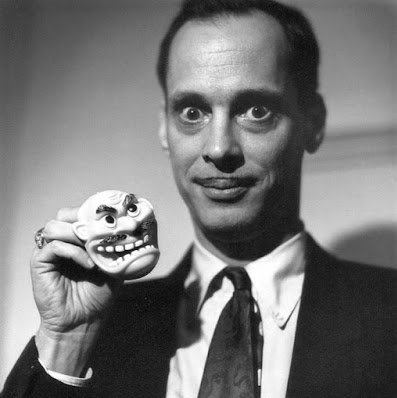
John Waters, the subversive auteur behind the cult films Pink Flamingos and Pecker, watched Ryan Murphy’s recent anthology TV series Feud every week. The show chronicles the rivalry between screen legends Bette Davis and Joan Crawford during the making of their 1962 film What Ever Happened to Baby Jane? Waters appeared in the show’s first season as William Castle, the director of Crawford’s B-grade horror movie Strait-Jacket. Decades before Murphy was championing women over 40 in his TV shows, Waters was doing the same for one of the biggest stars of the 1980s. His 1994 suburban-set black comedy Serial Mom cast former blockbuster darling Kathleen Turner in the role of a loving mother who maims and murders anyone who crosses her family. Serial Mom merges Waters’ trash film roots with Hollywood, poking fun at the middle-class, and the American obsession with true crime—well before the days of popular podcast Serial. Shout Factory recently released a special Blu-ray edition of the film.
Waters’ fans have been clamoring for a new film since the director’s last major feature, 2004’s A Dirty Shame. He spends a lot of time writing and reading (“Ariel Levy’s book The Rules Do Not Apply, about her sad miscarriage and breakup of her marriage to a woman” and The Son, currently), and he’ll be hosting an adult summer camp in September. “I’m writing two books, I’m writing a Christmas show, I’m promoting my new book, Make Trouble… I’ve got so many projects I can barely breathe,” he told Musings by phone recently. And he doesn’t discount the possibility of directing again. “I have four development deals… . None of them happened, but who knows? Next time they say yes, I’ll do one.” Musings revisits Waters’ serial killer comedy and the Pope of Trash’s career for a chat about sex, screenwriting, and suburban malaise.
Musings: Apart from being a great true-crime satire, Serial Mom is an interesting snapshot of the ‘90s. You reference things like Pee-Wee Herman—this was during his adult movie theater arrest scandal. Serial Mom was released two months before the O. J. Simpson white Bronco chase. And then Matthew Lillard would star in Scream, the biggest horror movie of the decade, just two years later. This was also when reality TV, talk shows, and court TV were really starting to become popular.
John Waters: I was ahead of my time! I was The Amazing Kreskin!
How much of the movie was informed by that vibe? You don’t strike me as a TV junkie.
I never watched any of that. I still don’t. A reality show asks you to put people down and feel superior. I don’t think I’ve done that in any of my movies. I ask you to love my characters, even though others wouldn’t.
What’s happened now is that every cable channel seems to be milking the true crime genre to the point that there’s nothing new. These documentaries are not documentaries. They’re just cut and paste jobs of the same thing over and over. They ruined the genre. Truman Capote started it with In Cold Blood, but now there aren’t many good hardback true crime books to come out that are well written. There are a lot of cheap paperbacks. The shows on TV are pretty bad, too. It seems like every cable station does another miniseries. The older ones were brilliant—but as we all know, whenever anything good happens, they do fifty bad imitations.
I didn’t see the new Casey Anthony. I think the Enquirer was a producer. I wrote something once about why I loved the National Enquirer. Well, I hate it now—because it’s just Trump every week. I can’t believe anyone is buying the National Enquirer anymore. The headlines aren’t funny or exciting. Even Trump supporters… I can’t imagine they would buy it.

You’ve said many times that whenever you make a movie about one of your obsessions, like true crime, that it’s over for you. How do you engage in your obsessions?
Obsessed just means interest to me. I keep reading about it. I keep files about it. Generally, I write about it now. I do a spoken word show all year called This Filthy World. I have a Christmas show that I do in 18 cities in 20 days. I write books all the time. Everything I’m interested in, I end up reading it and telling my own stories with it, using it for information in my own work. To me, the newspapers are my soap operas. I look at them every day. They’re my stories.
I went to so many trials when I was young. I went to Patty Hearst. I went to [Charles] Manson. I went to Hillside Strangler. All those trials kinda showed up in [Serial Mom]. In Pink Flamingoes and Female Trouble there’s a trial. There’s a mock trial in Desperate Living. I had those scenes in all my movies. I still think that a really good trial is theater.
Serial Mom and the true crime craze also make me think of how the Satanic Panic spread during the 1980s, and people became obsessed with the gory details of these made-up satanic rituals and abuses in the suburbs.
Oh, so many innocent people… some innocent people are still in jail! The Satanic Temple, who I am a supporter of—though I’m certainly not a Satanist— they go around the country crashing these conventions of doctors that believe in that stuff and exposing them. It all started with the McMartin case. I went to that trial a lot. They were innocent! Their entire lives were ruined, because of that panic. I’m not saying there were never any child molesters in daycare centers, but there were many, many, many who were not.
What was the atmosphere of the McMartin preschool trial?
I went a lot. I had lunch. I sat with the McMartins at the table. I said, “Why aren’t you so angry?” They said, “Because the lawyer won’t let us!” They were all found not guilty. The trial lasted forever. People burned down their school. When they sued, I think they only got a dollar once it was over. That poor old lady, Mrs. McMartin… they had pictures of her in leather S&M outfits in her wheelchair. They said children were taken away on airplanes. It was all bullshit! The children nicknamed the one accused man Ray Ray [Raymond Buckey, the grandson of school founder Virginia McMartin and son of administrator Peggy McMartin]. That was Johnny Knoxville’s name in A Dirty Shame.
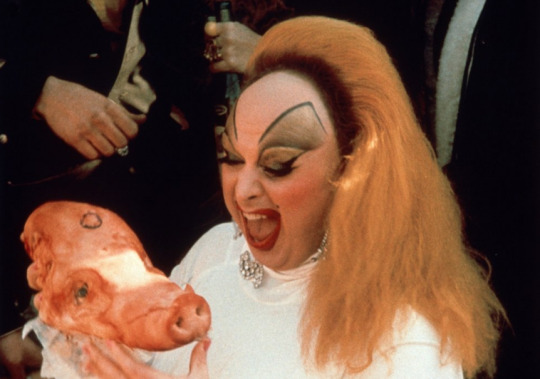
Polyester and Hairspray were made during that time and poke fun at suburban life and the idealism of the 1960s. Does the “there’s something rotten in the suburbs” theme still excite your imagination?
I always make fun of suburbia. Suburbans are always the villains in my movies. I grew up in suburbia—and it was the first thing I tried to escape, so I could go downtown and be a beatnik.
When I hitchhiked across the country, the people picking me up in Mid-America were lovely and great. I don’t think it’s so cut and dry anymore. You can live in suburbia, you can live in the city. Everywhere is cool—and there are assholes everywhere, too! You have to weave your way through society no matter where you live and pick and choose carefully.
What’s special about Serial Mom is how it combines all your worlds: suburbia, horror, Dreamlanders, and Hollywood stars you admired. When you work in the Hollywood system, do you feel like you have to scale back or tone it down?
No, I didn’t. Within the Hollywood system, every one of those movies I’ve ever done was a development deal. That’s when they pay you to go home and write it. If they don’t make the movie, you don’t have to pay them back. Every time I had a development deal, except twice, they didn’t make the movie—but they paid me.
With this studio system, there were a lot of problems. It was a company—and I’m not going to name names, because the film is over, and Hollywood’s treated me fairly. They didn’t know what to do with the movie. It tested fine with my fans, but then they said, “You can’t have [Kathleen Turner’s character] set somebody on fire.” I said, “But that was always in the script!” My editors just loved it. We had a test screening out in some deep suburban place in Los Angeles, where if you could come you couldn’t have heard of me. I said, “Well, why did you hire me?” They spent a whole lot of money to have a test screening to prove that some people wouldn’t like it. I remember pulling up to the theater with my editor and thinking, “Look at these people, oh my God. They’re so going to hate it.”
The funniest part of Serial Mom is that she’s just doing what she thinks is right, protecting her family.
Well, she is right—if she could kill people figuratively. The problem is, she does it literally.
All your characters share her attitude to varying degrees of insanity.
I don’t know about that. I’ve certainly changed the style. In the beginning, everyone was screaming and yelling. That’s coming from the Theatre of Cruelty, the Theatre of the Absurd, and lunatic underground movies. I also didn’t think that we had a good enough sound system, so everyone was shouting. But as we went along, I tried to have people act in a more normal way—and at the same time, say the lines as if they believed every single word. They were never saying it to be funny. Except for Tracey Ullman, I never hired comedians, because they seemed to bring shtick in—and I wanted them to say the lines as if they were acting in Long Day’s Journey into Night, no matter how ridiculous the lines were.
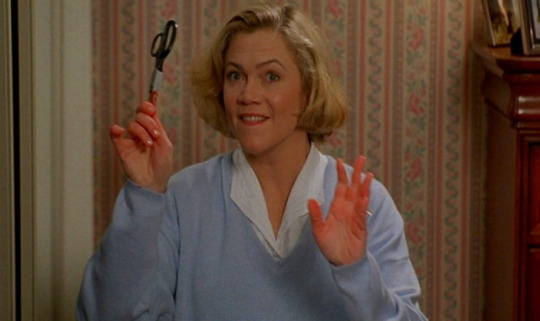
One of Serial Mom’s most loved scenes is the obscene phone call exchange between Kathleen and Mink.
My favorite thing about that was when I met Boy George. He gave me his phone number, and I called him. That was on his answering machine.
I know you thought of Pillow Talk’s use of split-screens for the phone call scene. Did you have other movies in the back of your mind when you shot Serial Mom?
I probably did, but God knows what. It’s very hard to shoot a split-screen phone call, because the timing has to be exactly right in the take you end up using. Usually the other person is right off set saying it, but you have to say it exactly the way you’re going to say it when you shoot that person. You can’t cut away in a split screen. It’s trickier than it looks.
Do you still write parts for actors, post-Divine?
I stopped writing parts for people after Desperate Living, because the part of Mole McHenry was originally written for Divine—and Divine couldn’t do it, because he was doing a play. Sue Lowe did a great job, but what I’m saying is I learned then not to write a part for a person.
I can’t imagine another actress playing Serial Mom other than Kathleen.
And Mink! Can anybody say the words “pig fucker” better than Mink?
I didn’t really write it for Kathleen. There were other people at one point with different studios that they wanted to do it. I did not. Whether I wrote that exactly for Mink I don’t remember. Probably I did, but you never knew what studio I was going to get and if they would approve it.
How do you work with an actor like Kathleen to foster that singular, incredible performance?
You pay a lot of attention to her. You don’t leave her on the set. You don’t say to her, “I don’t know, what do you think?” They want you to tell them what to do. Kathleen was great. I listened to her ideas. We had rehearsal for a week before shooting at my house, which I always do in my living room. You just don’t show weakness to a star. If I said, “Oh, I don’t know Kathleen, what do you think?” she would have eaten me alive. But I got along with her great—and I’m still friends with her. I still think she’s one of the best actresses in the world.
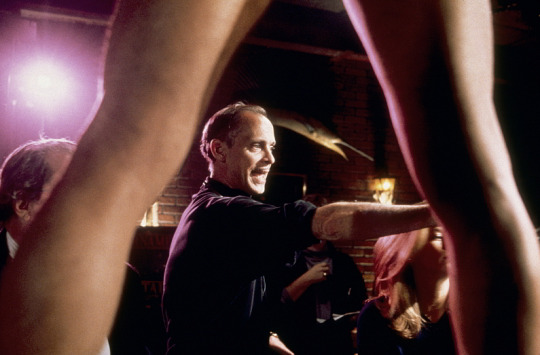
You love strong, difficult women. Who intimidates you?
I think Kathleen probably intimidated me the first day. I didn’t let her know that. Yes, smart women intimidate me. Rachel Cusk, a writer I really love, didn’t intimidate me—but when you meet them for the first time you think, “Wow, she’s so smart!” It’s usually women writers that I want to intimidate me. I want to meet people I think are smarter just to see what they’re like. I still write fan letters to people if I really love their book.
Who is the Waters woman you relate to the most?
They’re all partially me. They’re all based on something. I don’t know that I’m any of them, but I would have befriended all of them. I would have gotten along with all of them. And I would have tried to understand all of them. I would have been a good shrink for all of them.
What do you say to people who write off your characters as offensive and mean?
I don’t think any of my characters are mean. I think that’s why young people keep liking them, and they keep getting revived. Serial Mom wasn’t mean. She thought she was doing the right thing. She was wrong, but she killed for correct reasons. They either hurt her daughter or they didn’t recycle. She meant well.
In Pink Flamingos, the Marbles [played by David Lochary and Mink Stole] were way worse. They kidnap children. They kill people and everything. But even in their own world, they were just jealous of Divine’s fame and notoriety. If I write a villain, they’re mean—but they’re so ridiculously mean that the audience likes to shout out the awful stuff they say.
What advice would you give to writers so they don’t repeat themselves and dip into a bag of tricks?
Always dip into your bag of tricks! That is what storytelling is about. Good tricks. A trick is not necessarily a bad thing. It is a way to tell a story that gets people’s attention. Didn’t Alfred Hitchcock say, “Self-imitation is actually style?”
Rewatching Female Trouble, which I thought about a lot when watching Serial Mom again, there’s a scene where Dawn and Gator are having sex—with his toolbox. She says, “Can’t we do it normal?” And he tells her, “This is normal.” I actually got emotional, because even though the scene is funny and rejects heteronormative sex, her comment tugs at the heart.
Yeah, Gator was not a good husband to her. Everybody’s sex life is weird if you knew the real story. Divine’s character was trying to be good. That’s why Dawn Davenport had such a sad end, because she lost her mind. She had a bad, crazy little daughter. She had bad friends. Well, she had good friends, actually. Chicklet and Concetta were her real friends. But she got under control of really evil people that brainwashed her. She didn’t have any choice to escape Gator.
Do you have emotional moments like that when you’re alone, working on a script, writing comedy?
I go through that with all my characters. Even with Divine—who’s in the trial, wants to get the electric chair, and she’s crazy. Elizabeth Coffey in that scene says, “Oh, you’re so fucked up. This is real life. You’re not on a stage.” She is trying to help her to understand her lunacy. That’s what all my movies are about—not judging other people until you know the whole story.
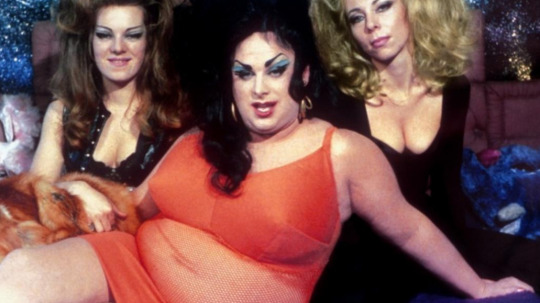
Going back to Dawn and Gator’s unusual lovemaking, what are your favorite movie sex scenes?
They always say in my movies, “Get it! Get it! Get it!” I don’t know why, I’ve certainly never said that in real life. But in every movie, it seems like they say that.
I always remember the shots in I, a Woman. In Multiple Maniacs I tried to do the reverse. In I, a Woman, [Essy Persson’s character] had black hair. It was always a shot of a woman moaning while the man was going down on her. I did the opposite with Mary Vivian Pearce. She had bleached hair, and the shot was set up to be the negative reversal of I, a Woman. But those are very obscure references to weird exploitation movies that I loved growing up.
In Carmen, Baby there was a scene where she picked up a bottle with her cooter. I certainly did that scene way later with Tracey Ullman in A Dirty Shame. I’ve never been to a party where someone tried to pick up a bottle with their vagina—not even at the wildest party I went to in San Francisco. Once I saw a girl take a shit on the stage at a punk rock show, but I never saw a bottle.
Your various writings have painted an incredible picture of your time at the drive-in watching Herschel Gordon Lewis films. What else were you watching at the drive-in that left an impression on you?
All the Blood Feast movies, yes. I saw Faster, Pussycat! [Kill! Kill!] at the drive-in for the very first time. People forget that the movie was a failure for Russ Meyer when it came out. I went back every night and dragged people to see it, because there was no video. You could never see it again. We went to see it probably seven nights in a row. I saw all of the bad horror movies and gore movies, too. Everyone would honk their horns when there were tits or blood.
You’re part of the new Tura Satana documentary, too.
Yes, I already did my interview for it. I met Tura toward the end of her life. She was great. I don’t think she really looked like that every day, but when she went to do the conventions, she put on the wig and the outfit. She was a great sport about it.
Lewis never deluded himself into thinking his movies were art. He was a showman, but it became hard for him to surpass the impact that Blood Feast had on audiences. Do you ever worry that you’ve topped yourself?
I never try to. After the ending of Pink Flamingos, I knew then that I couldn’t try to top that. It would never work, or I would paint myself in a corner that I could never get out of. There is not another scene in any of my movies that, I guess, is more shocking than that. But that movie was made at a certain time in history, when porno had just become legal, full-frontal nudity had just become legal… so what was left? Then, there was no law against eating shit. There is now, in the porn world—but I would never want to see that in a porno. I think we made a Jackass movie before Johnny [Knoxville], in a way. I think Johnny and his movies are the closest to the spirit of my early films.
In the time you spent with Lewis as a friend and fellow artist, what did he teach you about filmmaking?
I was in Blood Feast 2. When he made movies later in his career, he took an equally low-budget approach. He was furious if he needed a second take, because they had to waste that money—which I thought was kind of funny. He never thought he was an auteur. He was trying to get it done as cheaply as possible to make the most money he possibly could. He was a showman, but he was an exploiter. He wasn’t making art movies, but he would go around later to art theaters to cash in, because hipsters thought he was ironic—but that was not his audience. His audience was working-class people who thought his films were really scary.
Who is your audience?
My audience is all minorities who can’t even fit into their own minority.
